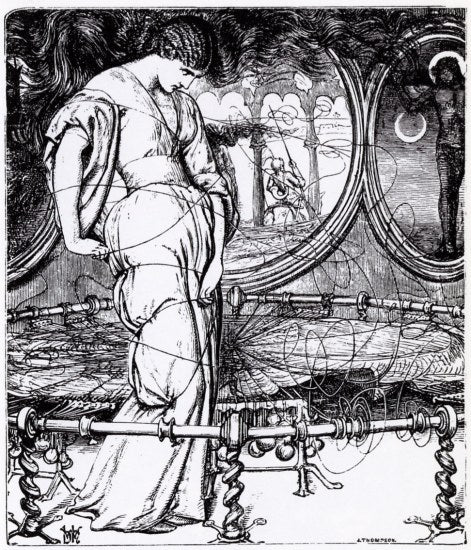Beskrivelse
The painting "The Lady of Shalott", painted by William Holman Hunt in 1888, is an emblematic work of Pre-Raphaelitism, an artistic movement that advocated a return to greater purity and sincerity in the representation of art, as opposed to what they considered the excessive academicism and coldness of contemporary artistic practices. Hunt, one of the founders of this movement, is known for his meticulous focus on detail and his vibrant use of color, aspects that are powerfully manifested in this work.
The composition of “The Lady of Shalott” focuses on a female figure against the backdrop of a natural landscape of extraordinary beauty. The lady, wrapped in a richly hued costume, is surrounded by wild flowers that seem to embrace her with their fragrance and color, creating an almost ethereal atmosphere. She stands in a boat, her back to the viewer, looking out towards the horizon, suggesting a longing and connection to the outside world that is forbidden to her. This depiction, evocative of the legend of The Lady of Shalott, resonates with themes of love, loss, and the struggle between desire and reality.
The use of colour in this painting is particularly striking. Hunt employs a rich and vibrant palette, where the greens and blues of the landscape contrast strikingly with the warm tones of the lady's dress. The attention to detail characteristic of Pre-Raphaelitism translates into a meticulous rendering of the surrounding flora and fauna: each leaf and petal seems to come to life under the golden light that floods the scene. This meticulousness not only serves to beautify the painting, but also lends a sense of atmosphere and context to the feelings of the protagonist.
As for the characters, the Lady of Shalott is the only human figure visible in the work, and her isolation is palpable. Her gaze lost in the horizon suggests a deep melancholy and a search for meaning. Through her representation, Hunt invites the viewer to reflect on the human condition, on the struggle between individual desires and the restrictions imposed by society. The work is inspired by the poem of the same name by Alfred Lord Tennyson, which narrates the life of a woman condemned to live in isolation, observing the world through a mirror and without being able to interact directly with it.
The symbolism in "The Lady of Shalott" is another aspect that deserves attention, as the lady herself can be interpreted as a representation of the artist in the process of creation, caught between reality and fantasy. Like the mirror that keeps her separated from the real world, art often acts as a means of escape, providing a window into what could be, but never will be.
In the context of Pre-Raphaelitism, Hunt not only captures the essence of a romantic narrative, but also reinterprets the traditions of art in a visual language that invites introspection. The Lady of Shalott thus becomes much more than just a painting; it stands as a testament to human longing, to the struggle between creativity and limitations, and to the eternal search for connection in a world that often feels unattainable. With her unmistakable style and poetic vision, Hunt leaves an enduring mark on British art, one that continues to resonate with contemporary audiences and invites deep reflection on the eternal themes of love, isolation and desire.
KUADROS ©, a famous painting on your wall.
Hand-made oil painting reproductions, with the quality of professional artists and the distinctive seal of KUADROS ©.
Painting reproduction service with satisfaction guarantee. If you are not completely satisfied with the replica of your painting, we will refund 100% of your money.

